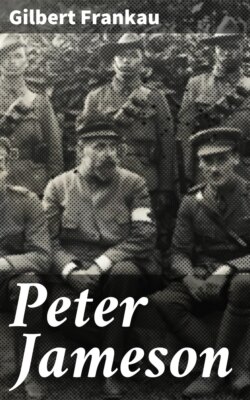Читать книгу Peter Jameson - Gilbert Frankau - Страница 30
На сайте Литреса книга снята с продажи.
§ 2
ОглавлениеTable of Contents
England’s declaration of war did not make Peter Jameson “burn to avenge gallant little Belgium,” or eager, in the phraseology of the period, “to do his bit.” His commercial position was too damned awkward for the indulgence of any such sentiments.
He left Wargrave at ten o’clock on the morning of August the fifth; and reached the outskirts of London in forty-five minutes. Then he gave the wheel to Murray, and began to think. Throughout, his hand had been perfectly steady at the throttle, his foot firm on the accelerator. Their speed had averaged forty miles an hour.
Behind him, in the tonneau, sat Francis Gordon, acting as always on inspiration rather than reason, decision already reached. Francis Gordon talked to himself, under his breath: first in Dutch and then in German. He was testing, not his knowledge of those languages, but his accent. “Ich kann es tun. Ich bin einer der einzigen die es tun konnen,” he muttered. Then he began to recite, very slowly and almost inaudibly, the first speech from Schiller’s Republican Tragedy:
Leonora. “Nichts mehr. Nichts mehr. Kein Wort mehr.
Es ist am Tag.”[1]
Peter was not talking to himself; had reached no decision. His brain went over the salient facts of the situation; weighing them up. Discarding details. Selecting essentials. The Jameson-Beckmann problem must wait. How would Nirvana be affected? Home-trade, for the moment at any rate, would collapse. The export-business might hold up. Might. Probably wouldn’t. Remained the fact that if the worst came to the worst he stood to loose seventeen thousand pounds. … After all, people must smoke. Wars didn’t last for ever. Could he see the thing through? Financially? …
“London & Joint Stock Bank, Pall Mall,” he said to the chauffeur.
They swirled through Piccadilly; nipped round past the Ritz; slowed down St. James’ Street; and pulled up.
“Afraid I can’t lend you the car, old man,” said Peter. “I shall want it all day. Are you coming down again to-night?”
“No,” answered Francis. “Prout’s bringing up my things on the afternoon train.” He stepped out of the tonneau; brushed himself carefully; and walked off down Pall Mall. Peter, telling Murray to wait, climbed the flat steps to the glass doors of the Bank. They were closed: but his knock brought a commissionaire, who recognized him; opened them.
“No business today, sir,” said the commissionaire.
“Manager in?” asked Peter.
“Yes, sir.”
“Ask him if he’ll see me.”
The Bank, always quiet, seemed—that morning—like a tomb. Clerks bent over their ledgers; lights burned: but no customers waited at the iron-grilled counters, no sovereigns clinked in the brass shovels.
“Step this way, sir,” said the commissionaire.
Peter followed him across the stone floor, through the glass doorway into the manager’s parlour—soft-carpeted, lavishly furnished with dark mahogany and saddle-bag chairs.
Mr. Davis, the branch-manager, was a gray-bearded man with the clothes of a prince and the manners of a diplomat. As a West End Branch, “Pall Mall” did not seek mercantile business. They had taken the Nirvana account, officially, “to oblige their old client Mr. Jameson, whose private account they had handled for so many years.” This courtesy had not gone as far as a reduction in their usual rates of interest!
“Good morning, Mr. Jameson. I half expected you.” Mr. Davis rose; shook hands. “Won’t you take a seat?”
“Thanks. I came to ask you about the financial position. This war, you know. The papers talk about a moratorium. I understand that to mean a suspension of credit. …”
“Only in extreme cases, Mr. Jameson. Only in extreme cases. Of course, we are not desirous, at the moment, of increasing facilities. We are, if I may use the expression, sitting on the fence. But my directors—I have a letter from them before me now—are anxious for me to impress on all our clients, that they do not anticipate any financial crisis. Measures, as I am given to believe, have been taken; temporary expedients adopted; by which. …” He went on to explain them, at some length.
“Then I take it,” said Peter, “that on the resumption of banking-business. …”
“Matters will be exactly as they were a week ago.” Mr. Davis rose again, shook hands, made his point courteously. “Naturally, Mr. Jameson, as Nirvana Limited will not be under the necessity of making payments, they will not require any addition to the overdraft which you have guaranteed for them.”
“Of course not,” said Peter. The interview had turned out according to anticipation. If Nirvana wanted any more money, it would have to be found in cash.
He stood for a moment on the steps of the Bank. London had not altered in a night. The straight aristocratic thoroughfare seemed a little busier than usual. That was all. Then he looked for the gaudy sentries outside Marlborough House; saw that they were in khaki!
“The factory, please, Murray; and as fast as you can,” said our Mr. Jameson. …
| [1] | “No more. No more. Not a word more. It is the Day.” |
